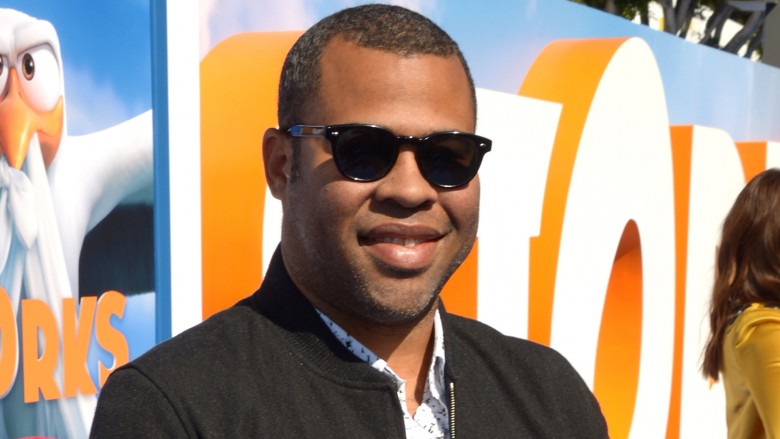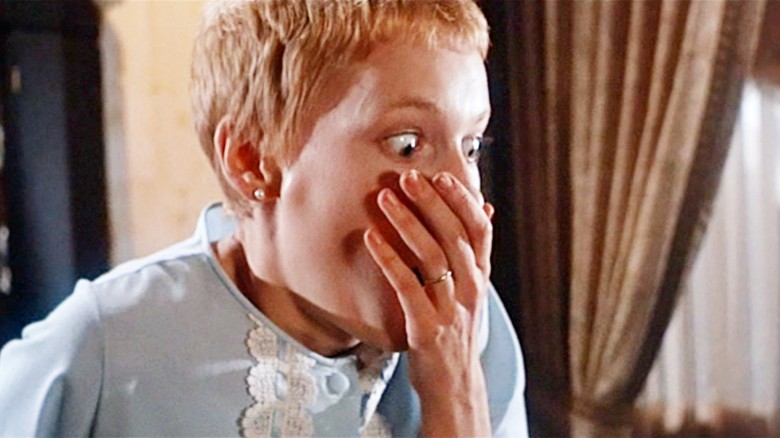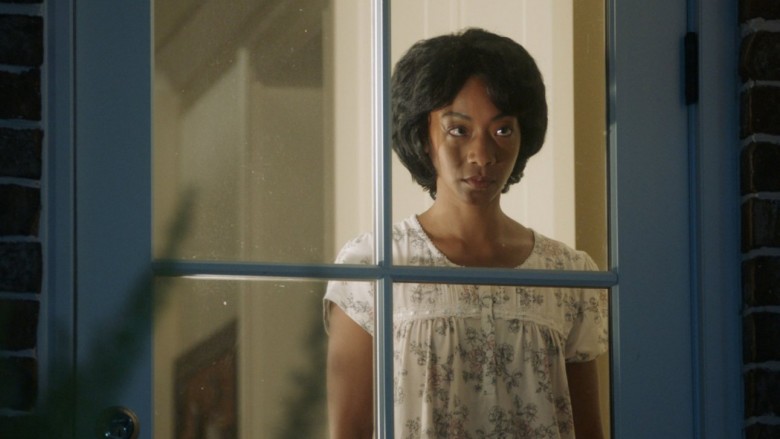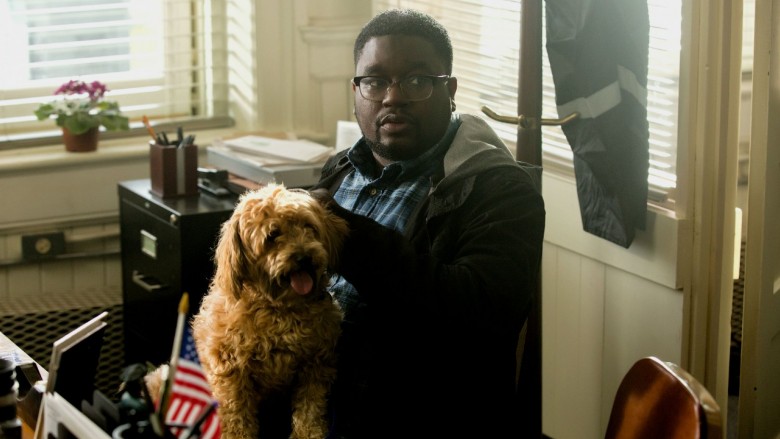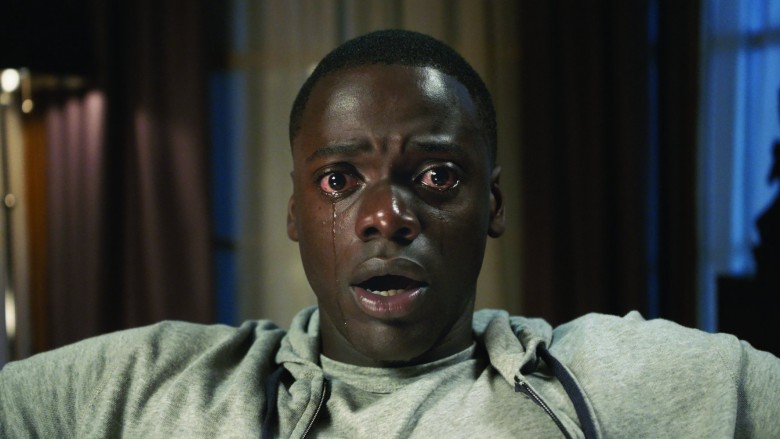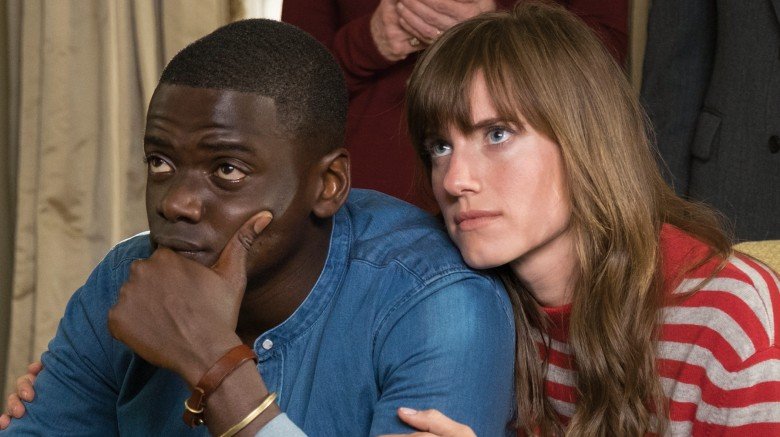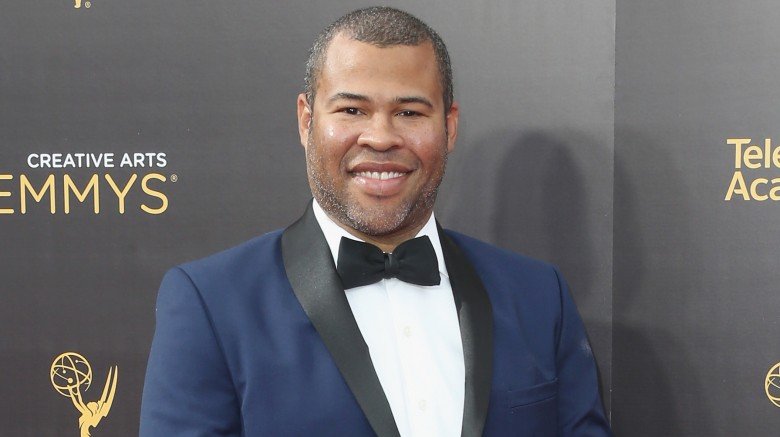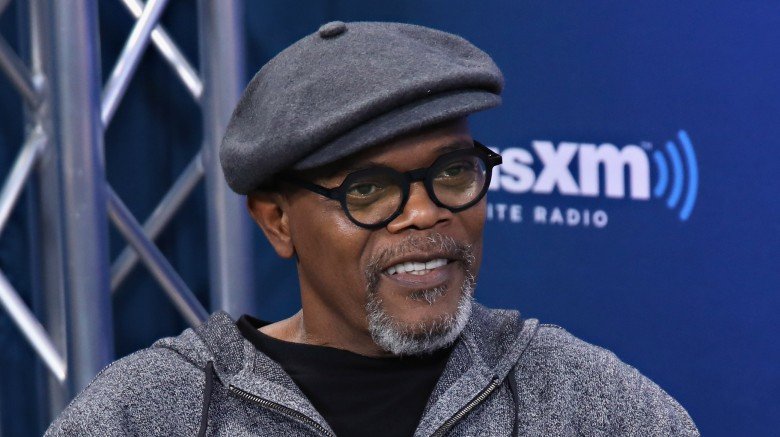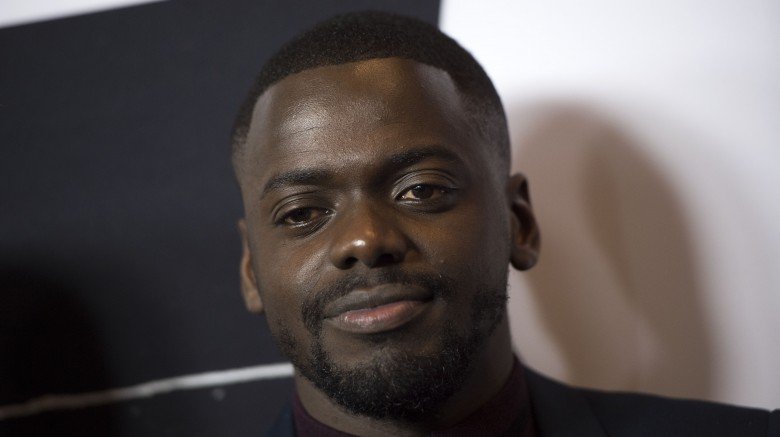The Untold Truth Of Get Out
The record-breaking horror hit Get Out deals with the scariest thing of all...racism. Jordan Peele wrote and directed this socially conscious thriller to capture the feeling of being an outsider and how it can turn quickly from awkward to dangerous. Debuting at number one at the box office and holding its own among blockbuster competition, Get Out is a film to be remembered and we're here to get to its untold truth. Warning: Lots of spoilers ahead!
Jordan Peele started working on it before Obama was in office
Though the film seems tailor-made for Trump's America, Jordan Peele had the idea for Get Out even before Barack Obama was elected president. In an interview with the Los Angeles Times, he recalled being inspired during the 2008 primary season after watching Democratic voters split between Obama and Hillary Clinton. "'Who deserves to be president more? Who's waited long enough?' Of course, it's an absurd thing that civil rights are even divided," said Peele. "It should be one civil right."
After Obama's election, Peele was inspired by the new "post-racial" ideal. Seeing how many people believed that a black President meant racism was over and no longer something that needed to be discussed, he wrote Get Out as a response—to show that it's not just cross-burning Klan members who are racist, but that racist feelings can easily creep into the most liberal of neighborhoods. "This was really meant to take a stab at the liberal elite that tends to believe that they're—we're—above these things."
Peele took influences from a lot of horror classics
Though Peele co-wrote and starred in his sketch show Key and Peele, this was his first time behind the camera for a feature film. To help him along, he drew inspiration from a number of classic horror films, including Rosemary's Baby and The Stepford Wives. Not too surprising, given that both films are about seemingly well-meaning people doing horrible things.
Peele told The Verge that he also found inspiration from The Shining. The Overlook Hotel is basically a character of its own that's full of malevolence despite its lovely setting. Surprisingly, Halloween also worked its way in—not that there's a masked killer in Peele's film, but both find the horror beneath the white picket fences of suburbia.
One of the creepier sequences came from a dream
Get Out doesn't have a lot of jump scares, blood, or gore, but that doesn't mean it isn't creepy. One of the more frightening scenes comes when Chris decides to go upstairs to get away from the white weirdos at the party. Though all the guests are happily chatting amongst themselves, the second Chris moves out of earshot, they instantly fall silent. We watch the guests' eyes move in unison as they follow Chris' every step above them. As an audience, we don't know why they're paying such attention to the new boyfriend, but it's certainly creepy.
Fortunately (and unfortunately) for Peele, this scene came to him in a dream. In his nightmare, Peele strolled through a busy bank lobby and when he turned the corner and was out of sight, he heard all the sound stop. People stopped talking and stood stock still. Peele creeped bank into the lobby and found everyone silently staring at him. It's too bad he had to deal with that nightmare, but great that it inspired such a memorable scene.
The lyrics to the theme song of the film are a warning
Though the lyrics are mostly in Swahili, it's clear that "Sikiliza Kwa Wahenga" isn't some happy-go-lucky theme song. Between the whispered voices and the Southern-sounding banjo, the audience instantly knows something is wrong and it's only going to get worse.
In conversation with GQ, Peele explained the lyrics behind the track that wraps around the film. After saying "Brother, brother" in English, the lyrics switch to Swahili and roughly translate to "Watch your back. Something's coming, and it ain't good."
For the rest of the soundtrack, Peele wanted music with black roots that felt ominous. "African-American music tends to have, at the very least, a glimmer of hope to it—sometimes full-fledged hope. I wanted Michael Abels, who did the score, to create something that felt like it lived in this absence of hope but still had [black roots]. And I said to him, 'You have to avoid voodoo sounds, too.'" The resulting soundtrack is hope and voodoo-free, and does a perfect job of conveying the building menace of Chris' situation.
Lil Rey Howery improvised some of his best lines
Despite the building tension and flat-out scary moments, Peele didn't make a film without humor. Lil Rey Howery plays Rod, Chris' best friend and proud TSA employee that ultimately saves the day. Howery spoke to Vulture about how Rod, unlike most comic relief characters, is a smart guy who figures things out before anyone else. He just happens to be funny while doing it.
Though the part was written to be comical, Peele was fine was Howery adding his own stuff from time to time. When he finds out that Peele's girlfriend Rose (Allison Williams) is lying to him over the phone, Howery improvised "the TSA tingles." It's a great line and the best endorsement the actual TSA has ever had. Howery riffed a lot on set and one of the best bits that made it into the film is his mini-diatribe about Jeffrey Dahmer. It's a little too R-rated to be quoted here, but it's a hilarious moment that also proved that everyone should have listened to Rod all along. Which leads nicely into his well deserved "I told you so," another line Dowery requested in the script.
The milk scene is even creepier than it seems
You wouldn't think Froot Loops and milk could be frightening, but Allison Williams pulls it off. When Rose eats dry cereal alone in her bed while scouting for new victims and taking sips from a tall glass of milk, she is a vision of clear evil. Peele didn't originally have this visual in the script. A few days before the shoot, he came up with the idea and knew instantly that it hit the perfect funny/terrifying tone. Turns out Peele was pretty prescient with milk signaling a sign of malignant whiteness.
Two weeks before the movie came out, some Nazis hijacked Shia LaBeouf's anti-Trump livestream to show off swastika tattoos, spew hateful rhetoric, and drink a bunch of milk. "Hey you nonwhites: I can do this and you can't," said one Nazi while downing some two percent. The alt-right has taken on milk as an emblem for their movement since it's the color of their pride and they believe minorities have greater lactose intolerance. Peele wasn't aware that the drink of comical mustaches was a symbol of hatred, but it makes the scene even freakier.
The film originally had a much darker ending
Since the film took a lot of time to develop, it's not surprising to find that some changes were made along the way—and the biggest was the ending. In theaters, as the audience sees the red and blue lights, they assume it's the cops and Chris is doomed. But when we see the airport logo on the door and Rod steps out, the audience goes nuts. Though it's hard to call the finish a happy ending, it's one of the most hopefully satisfying in a modern horror movie.
Originally, though, Peele wanted to keep with a darker tone. The film would end with Chris being pulled away by the cops and being arrested for all the murders in Rose's home. He changed his mind not only because that would have been so freaking sad, but because times were changing. During the Obama administration, Peele wanted to fight against the idea that racism was over, so the sad ending would help prove that point. But with the ongoing dialogue over race relations returning to the forefront of the national consciousness in recent years, Peele felt it made more sense to depict an African-American protagonist who wins.
The movie has made history
Get Out was an immediate success, taking first place at the box office over its opening weekend and staying in the top three despite strong competition from Logan and Kong: Skull Island. More importantly, the film is now a record-breaker: Peele is the first African-American writer/director to helm a film that made over $100 million. Making $111 million domestically in its first three weeks, it also became the fastest Blumhouse picture to conquer the $100 million mark. Since it's so early in the film's run, who know how many other box office records Get Out will break?
Peele has four other social thrillers in the works
It looks like Peele's foray into horror won't be over for awhile. Though he was previously best known for his comedic skills, Peele told Insider that he has ideas for four more "social thrillers" that he'd like to make in the next ten years. He wouldn't go into too many details, but he hinted, "The scariest monster in the world is human beings and what we are capable of, especially when we get together. I'm working on these premises about these different social demons. These innately human monsters that have been woven into the fabric of how we think and how we interact. Each one of my movies is going to be about one of these different social demons."
Samuel L. Jackson had problems with the casting
Get Out has enjoyed nearly universal acclaim, but it faced some criticism from Samuel L. Jackson. He said he loved the film, but felt it would have been better with an African-American in the lead instead of Daniel Kaluuya, who hails from England. In a radio interview with Hot 97 he pondered, "what Get Out would have been with an American brother who really feels that." Jackson seems to be giving the U.K. a lot of credit by assuming black men face nothing like the horrors Chris encounters in the film.
Kaluuya respectfully disagrees. Though he credits Jackson with breaking boundaries, he refutes the idea that he hasn't experienced prejudice. "This is the frustrating thing, bro—in order to prove that I can play this role, I have to open up about the trauma that I've experienced as a black person. I have to show off my struggle so that people accept that I'm black. No matter that every single room I go to I'm usually the darkest person there. You know what I'm saying? I kind of resent that mentality. I'm just an individual."
Kaluuya has dealt with his fair share of race-related problems. In 2010, he sued the London Metropolitan Police for assault and false imprisonment after four officers dragged him off a bus and threw him to the ground, one placing a boot on his head. He was then taken to Kentish Town police station and strip-searched, all because he matched the description of "someone acting suspiciously in the area."
Daniel Kaluuya is already busy with major offers
Before Get Out, Daniel Kaluuya appeared in Kick-Ass 2 and Sicario, plus a variety of British TV shows like Skins and Black Mirror. If you haven't seen Kaluuya in Black Mirror's series one episode "Fifteen Million Merits," please watch it now. He's incredible and it will only make you enjoy Chris from Get Out even more. Going forward, it looks like his first American leading role will keep Kaluuya pretty busy. He appeared in Black Panther, and he'll also take the lead in Steve McQueen's Widows. Cynthia Erivo, Michelle Rodriguez, and Viola Davis are already attached to this heist movie written by McQueen and the author of Gone Girl, Gillian Flynn.
People are doing a "Get Out" challenge, which is less scary than it sounds
In addition to ardent fans and critical acclaim, Get Out has also inspired a social media challenge. That's how you know you've really arrived. You'd think the Get Out Challenge might feature some kind of nefarious Caucasian activity, but it's actually much less frightening.
The challenge asks you to run straight at the camera, then perform a tight turn away at the last second, replicating the scary move made by Walter (played by Marcus Henderson) at one point in the film. It's a lot harder than it sounds.
A lot of these attempts end in failure, but it's pretty funny to watch them try. Plus, it proves that Henderson has some real talent, because the #GetOutChallenge shows that, on most people, the run is way more stupid-looking than scary.
